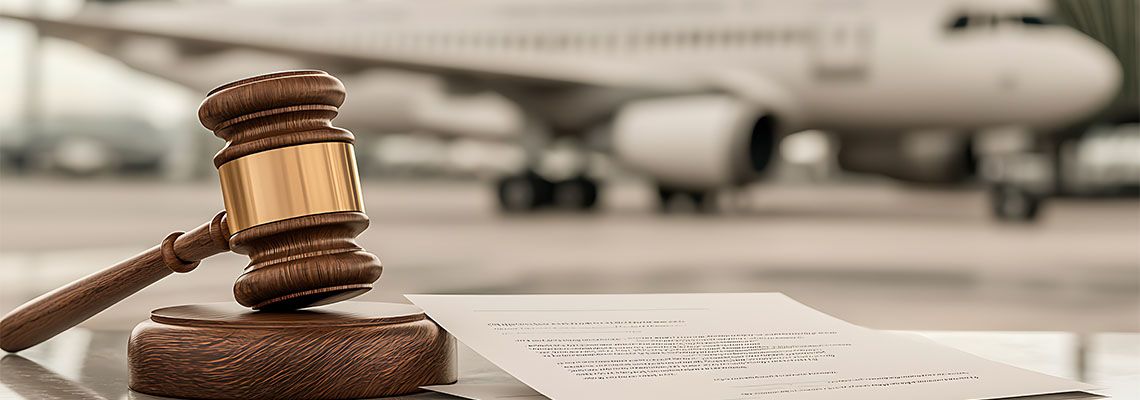Acquiring an aircraft for your business is a monumental step that can revolutionize your operations, improve efficiency, and even offer an edge in a competitive market. However, deciding whether to purchase or lease a plane is no small task.

What Role Does Insurance Play in Aviation Litigation Settlements?
Aviation litigation often involves highly complicated disputes, and the role of insurance in these cases cannot be overstated. From determining liability to covering damages, insurance policies play a pivotal role in resolving aviation claims effectively. Understanding how insurance interacts with litigation settlements can make a significant difference in protecting the interests of people engaged in the aviation industry.
William G. Harger & Associates, PLLC, led by Attorney Bill Harger, is uniquely positioned to help clients navigate these challenging cases, thanks to over 25 years of aviation law experience and a background as a former pilot. With an office in Richmond, Texas, the firm assists clients throughout the United States, as well as some international clients.
The Critical Role of Insurance in Aviation Disputes
At the core of many aviation litigation settlements is an elaborate network of insurance policies held by operators, manufacturers, and other stakeholders. Coverage for liability claims, property damage, and even passenger injuries is often provided through comprehensive aviation insurance.
Policies are meticulously crafted to address the many risks associated with aircraft operation, manufacturing, and maintenance. When litigation arises, insurance coverage often determines the financial aspects of the settlement process.
For instance, if a claim involves a mid-air collision or mechanical failure, determining which insurance policy is triggered and the extent of coverage available is critical. Ambiguities in language or policy exclusions can lead to substantial disputes among parties involved.
With his wealth of experience, Attorney Bill Harger offers a detailed understanding of these situations. He strives to prepare his clients to efficiently address issues involving policy limitations, exclusions, or coverage disputes.
The Interplay Between Liability and Insurance
A key question in aviation litigation is which party bears responsibility. Liability may rest with the maintenance crew, aircraft operator, parts manufacturer, or another stakeholder, depending on the scenario. Each party’s respective insurer might attempt to limit liability or apportion it to others, making thorough investigations and precise legal strategy indispensable.
William G. Harger & Associates, PLLC, helps clients unravel these liability questions. The firm’s insight into aviation law, backed by real-world aviation experience, empowers clients to examine evidence such as flight records, maintenance documentation, and weather data. This level of analysis makes sure liability determinations are based on solid factual and legal grounds, thus increasing the likelihood of fair outcomes for those involved.
Why Settlement Negotiations Are Often Complicated
Insurance companies that are involved in aviation disputes often seek to resolve cases through settlements rather than protracted litigation. Settlement negotiations in these cases require a thorough understanding of both aviation and the significant financial stakes at issue.
Insurers may propose payouts that do not fully account for damages, demanding careful scrutiny from the plaintiff’s legal team. Conversely, defendants must ensure their insurers fulfill commitments outlined in their policy agreements.
William G. Harger & Associates, PLLC has successfully guided clients through settlement negotiations by leveraging strategic approaches tailored to aviation-related disputes. The firm informs clients of every aspect of the settlement process, thereby helping them avoid pitfalls such as unfair offers or prolonged delays in negotiations.
Global Implications in Aviation Insurance
Aviation is inherently international, which introduces added complications to insurance matters. For instance, cross-border disputes may involve policies governed by different regulatory standards, laws, or jurisdictions. Additionally, international aviation accidents may trigger insurance claims involving foreign operators and insurers.
The global perspective offered by William G. Harger & Associates, PLLC is an asset for clients going through these challenges. With experience working with clients across the United States and international clients from regions such as Switzerland, Australia, and Mexico, the firm is well-equipped to handle cases involving diverse jurisdictions.
Why Clients Trust William G. Harger & Associates, PLLC
For clients facing aviation litigation that involves detailed questions of insurance coverage, liability, and settlement strategy, William G. Harger & Associates, PLLC, offers unparalleled legal services. Attorney Bill Harger’s dual background as a pilot and attorney makes him a trusted partner for clients in the aviation sector. This combination of logistical and legal knowledge allows clients to benefit from a comprehensive approach to their cases.
Free consultations are available to those seeking guidance on aviation matters. Whether you are a U.S.-based client in Texas or an international operator in Australia, Switzerland, or Mexico, the firm provides tailored legal strategies that meet your specific needs. This commitment to personalized service, coupled with extensive legal experience, has made William G. Harger & Associates, PLLC, a go-to firm for aviation litigation.
If you're involved in an aviation-related dispute, especially if it involves insurance settlements, contact William G. Harger & Associates, PLLC. Their Richmond, Texas, office serves as a hub for both national and international clients, connecting them with the legal representation they need in today’s high-stakes aviation environment.
RECENT POSTS
Corporate aircraft are valuable assets that require meticulous care to operate safely, effectively, and in compliance with regulations. For aircraft owners, operators, and aviation businesses, it's not just about ensuring the aircraft remains airworthy but also about protecting the significant investments tied to these machines.
The aviation industry is a dynamic and complex sector, where businesses often collaborate to share resources, reduce costs, and expand their reach. One of the most effective ways to achieve these goals is through a joint venture. Whether it’s a partnership between airlines to streamline operations or a collaboration between manufacturers to develop cutting-edge aircraft technology, joint ventures play a pivotal role in shaping the industry.



